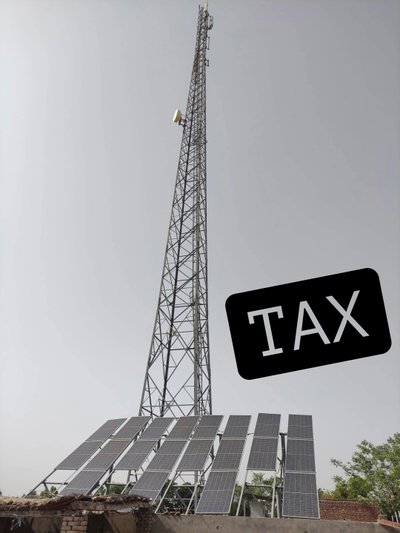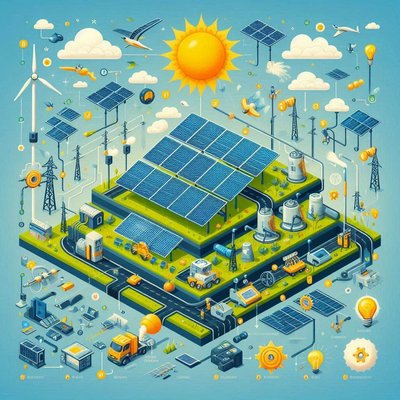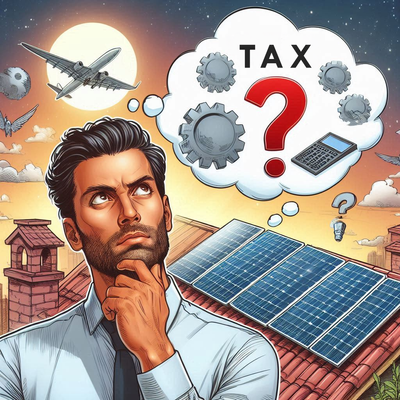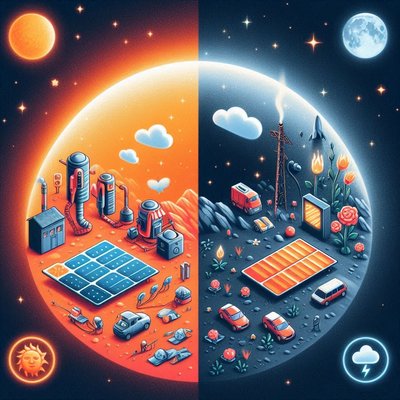Beta.peakd.com:
https://beta.peakd.com/hive-153850/@dlmmqb/tax-on-solar-system-or-swlr-ssm-pr-yks


Undoubtedly, I take immense pride in living in Pakistan and being a Pakistani. Hence, if I point out any shortcomings in my country or society in a blog, it doesn't imply that I am criticizing my nation. Rather, the purpose of such blogs is to spread civic awareness. Today's blog, filled with critical viewpoints, falls under the same category. However, this perspective cannot hinder my patriotic love and loyalty to my country. Today, I am going to discuss a recent news topic that has been circulating widely: the potential imposition of taxes on solar energy systems by the government. This news has created a wave of concern across Pakistan, with people discussing it in various ways.
بلاشبہ مجھے پاکستان میں رہنے اور پاکستانی ہونے پر فخر ہے. اس لیے میں اگر کہیں کسی بلاگ میں اپنے ملک میں، یا معاشرے میں موجود کسی خرابی کی نشاندہی کرتا ہوں تو اس کا ہرگز یہ مطلب نہیں ہوتا کہ میں اپنے ملک پر تنقید کر رہا ہوں. بلکہ ایسی بلاگز کا مقصد ایک شہری آگہی پھیلانا ہوتا ہے. میری آج کی بلاگ بھی اسی قسم کی تنقید سے بھرپور آپ کو نظر آئے گی. لیکن یہ نقطہ نظر میری ملی محبت اور ملکی وفاداری میں حائل نہیں ہو سکتا. آج میں جس موضوع پر بات کرنے جا رہا ہوں. وہ حال ہی میں کچھ دنوں پہلے گردش کرتی خبر سے متعلق ہے. اب بھی پورے پاکستان میں یہ خبر گردش کر رہی ہے کہ حکومت اب سولر انرجی سسٹمز پر ٹیکس لگانے سے متعلق غور و فکر کر رہی ہے. اس خبر کو لے کر ملک کے طول و عرض میں عجیب قسم کی تشویش پھیلی ہوئی ہے اور لوگ طرح طرح کی باتیں کر رہے ہیں.


Solar System Technology in Pakistan:
In a developing country like Pakistan, the issue of electricity has always been a hot topic. Pakistan has numerous electricity generation companies, several dams, turbines, and much more. In fact, if electricity production is properly utilized, Pakistan can not only meet its own needs but also sell electricity to other countries. However, private companies purchase cheap electricity from our power generating plants and sell it back to us at high prices, often not providing electricity at all. Prolonged power outages, sometimes lasting ten to twelve hours a day, have become a norm. In such situations, when electricity is not available, an average person starts thinking of alternatives. Therefore, they resort to generators, UPS, or other measures to meet their electricity needs during load shedding. At such a juncture, solar system technology emerged as a divine blessing for the Pakistani public. As soon as this blessing became accessible, people started rapidly shifting their electricity systems to solar power.
سولر سسٹم ٹیکنالوجی پاکستان میں:
پاکستان جیسے ترقی پذیر ملک میں بجلی کا موضوع ہمیشہ سے بہت زور و شور سے موضوع بحث رہا ہے. پاکستان میں بجلی بنانے کی درجنوں کمپنیاں موجود ہیں. کئی ڈیمز ہیں، ٹربائنز ہیں، کیا کچھ نہیں ہے. حتیٰ کہ اگر واقعی صحیح معنوں میں بجلی کی پیداوار کا صحیح استعمال کیا جائے تو پورے پاکستان کی بجلی کی ضرورت پوری ہونے کے بعد پاکستان دیگر ممالک کو بھی بجلی فروخت کر سکتا ہے. مگر ہمارے پاور جنریٹنگ پلانٹس سے پرائیویٹ کمپنیاں اپنی من مانی مرضی کے مطابق سستی بجلی خرید پر ہمیں ہی مہنگی بجلی دیتے ہیں. بلکہ بسا اوقات تو بجلی دیتے ہی نہیں. کئی کئی گھنٹے بجلی کی لوڈشیڈنگ جاری رہتی ہے. بجلی کے بغیر ایک منٹ گزارنا مشکل ہے مگر پاکستانی عوام دن میں دس سے بارہ گھنٹے کی لوڈشیڈنگ بھی برداشت کرتی ہے. اب ایسی صورتحال میں، جب بجلی میسر نہ ہو تو ایک عام آدمی کے ذہن میں کسی متبادل کو اختیار کرنے کا خیال آتا ہے. لہٰذا وہ پھر جنریٹر، یو پی ایس یا دیگر ایسی تدابیر اختیار کرتا ہے، جس سے وہ لوڈشیڈنگ کے دورانیہ میں اپنی بجلی کی ضروریات کو پورا کر سکے. ایسے موقع پر سولر سسٹم ٹیکنالوجی ایک نعمت خداوندی کے طور پر پاکستانی عوام کو میسر ہوئی. جونہی یہ نعمت پاکستانیوں کو میسر ہوئی تو اہلیان پاکستان نے دھڑا دھڑ اپنا بجلی کا نظام اس پر منتقل کرنا شروع کر دیا.


Benefits of Solar Energy:
Solar systems are a cutting-edge technology that converts sunlight into electricity. With the help of solar panels, you can use power point technology to generate electricity for your entire house from solar energy. This system can be easily installed in your home. If a large number of solar panels are installed, people can produce their own electricity, thereby escaping expensive electricity bills. Solar systems are not affected by the national energy crisis or fuel market instability. They incur low installation costs and are environmentally friendly since they produce no pollution, noise, or waste. Considering these benefits, the Pakistani public warmly embraced this technology, and solar panels began appearing on rooftops across the country. You might be surprised to learn that even today, there are many areas in Pakistan where electricity has not reached. In these areas, people can easily generate their own electricity using solar systems.
شمسی توانائی کے فوائد:
سولر سسٹم ایک ایسی جدید ترین شمسی توانائی کا نظام ہے جو سورج کی روشنی کو بجلی میں تبدیل کر دیتا ہے. سولر پینلز کے ذریعے آپ پاور پوائنٹ ٹیکنالوجی کی مدد سے پورے گھر کی بجلی شمسی توانائی سے بنا سکتے ہیں. یہ نظام بڑی آسانی سے آپ کے گھر میں انسٹال کیا جا سکتا ہے. اگر زیادہ مقدار میں سولر پینل لگا لیے جائیں تو عوام اپنے گھر کی بجلی خود تیار کر سکتی ہے، جس کے نتیجے می مہنگے بجلی کے بلوں سے چھٹکارا مل سکتا ہے. سولر سسٹم ملکی توانائی کے بحران یا ایندھن کی مارکیٹ کے عدم استحکام سے متاثر نہیں ہوتا. اس کو انسٹال کرنے پر کم لاگت آتی ہے. اس کے علاوہ اس کی پیداوار ماحول کے لیے بھی مثالی ہے کیونکہ یہ کسی قسم کی آلودگی، شور، فضلہ وغیرہ نہیں بناتی. شمسی توانائی کے فوائد کو مد نظر رکھتے ہوئے پاکستانی عوام نے بھرپور انداز میں اس ٹیکنالوجی کا خیر مقدم کیا اور گھر گھر میں سولر پینل دکھائی دینے لگے. آپ کو شاید یہ جان کر بھی حیرت ہوگی کہ پاکستان میں اب بھی ایسے کئی علاقے ہیں جہاں تک بجلی نہیں پہنچ سکی ہے. وہاں لوگ بآسانی سولر سسٹم کے تحت اپنی بجلی آپ بنا سکتے ہیں.


Possible Reason for the Tax:
Now, if solar technology has so many benefits, why is the Pakistani government considering imposing an additional burden of taxes on solar systems along with the existing electricity expenses? This indeed seems unfair. For now, the good news is that Pakistan's Minister of Energy has denied the rumors of imposing a fixed tax of 2000 rupees per kilowatt on solar systems, stating that these reports are baseless. However, this matter is still under consideration because there is a growing trend among the public towards adopting solar systems. It's important to note that when electricity is generated from solar systems, the excess electricity produced can be fed into the national grid. The government has to provide subsidies for this through net metering, which imposes a burden on the government in terms of capacity payments. To manage this burden, the government has to raise electricity prices in the form of base tariffs or other charges. According to the Pakistan Power Division, there has been a significant increase in solarization since 2017. The extensive use of solar panels by the wealthy has led to a disproportionate impact on poor consumers of national electricity. According to the Power Division, domestic and industrial consumers, along with the government, are bearing a burden of approximately 1 rupee and 90 paisa in subsidies, affecting around 25 to 30 million poor consumers. This 1 rupee and 90 paisa are being transferred from the pockets of the poor to the wealthy. If this continues, the electricity bills for poor consumers could increase by at least 3.35 rupees per unit. Therefore, the matter of imposing a tax on solar systems is still under deliberation.
ٹیکس کی ممکنہ وجہ:
اب اگر بات یہ کہ جائے کہ سولر ٹیکنالوجی کے اس قدر فوائد ہیں تو بھلا پاکستانی حکومت کیوں عوام پر بجلی کے بوجھ کے ساتھ ساتھ سولر پر ٹیکس کا بوجھ بھی ڈال رہی ہے؟ یہ تو سراسر زیادتی ہے. فی الحال تو خوشی کی بات یہ ہے کہ پاکستان کے وزیر توانائی نے سولر سسٹم پر ٹیکس لگانے سے متعلق خبروں کی تردید کی ہے کہ سولر سسٹم کے فی کلو واٹ پر 2000 روپیہ فکسڈ ٹیکس سے متعلق گردش کرتی ہوئی تمام خبریں بے بنیاد ہیں. البتہ یہ معاملہ زیر غور ضرور ہے. کیونکہ عوام کا زیادہ تر رجحان اب سولر سسٹم کی جانب جاتا دکھائی دے رہا ہے. یہاں یہ بات ہمیں معلوم ہونی چاہیے کہ سولر سسٹم سے جب بجلی بنائی جاتی ہے تو گھر کی ضرورت سے زائد بجلی بھی سولر سسٹم سے حاصل ہوتی ہے. اب اس اضافی بجلی کو نیشنل گرڈ میں شامل کیا جاتا ہے تو حکومت کو نیٹ میٹرنگ کے زریعے اس پر سبسڈی دینی پڑتی ہے، یہ سارا بوجھ کیپیسٹی پیمنٹ کی سکل میں حکومت پر آتا ہے اور اس بوجھ سے نمٹنے کیلئے حکومت کو بیس ٹیرف یا کسی اور شکل میں بجلی کی قیمت بڑھانی پڑتی ہے. پاکستان پاور ڈویژن کے نوٹس کے مطابق 2017 کے بعد سے سولرائزیشن میں بہت تیزی سے اضافہ ہوا ہے. امیروں کے بے تحاشہ سولر پینلز لگانے کی وجہ سے قومی بجلی کے غریب صارفین کو نرخ کے معاملے می زیادتی کا سامنا کرنا پڑ رہا ہے. پاور ڈویژن کے اعلامیے کے مطابق گھریلو اور صنعتی صارفین سمیت حکومت کو بھی سبسڈی کی شکل میں ایک روپے 90 پیسے کا بوجھ برادشت کرنا پڑرہا ہے اور اس کےنتیجے میں تقریباً ڈھائی سے تین کروڑ غریب صارفین متاثر ہو رہے ہیں، یہ ایک روپے 90 پیسے غریبوں کی جیب سے نکل کر متوسط اور امیر طبقے کے جیبوں میں جارہے ہیں، یہی سلسلہ جاری رہا تو غریب صارفین کے بلز میں کم ازکم 3.35 روپے فی یونٹ کا مزید اضافہ ہوجائے گا. لہٰذا سولر پر ٹیکس کا معاملہ فی الحال زیر غور ہے.


Solar System: Convenience or Hardship?
After reading about the benefits of solar systems, you might think that since solar systems are cheaper than conventional electricity and even, we earn money by selling the excess electricity to the government, they are a great convenience. Yes, they are indeed convenient for the public, but they pose a significant challenge for the government. This is because the individuals adopting solar energy are mostly those who can afford it. These individuals are the ones who use the most electricity and regularly pay their electricity bills. Now, the remaining consumers on the national grid have lower electricity consumption, and recovery of electricity bills from them is also less. To understand this, consider a bus with ten passengers, out of which three have bought their own cars. The bus still needs to operate, and its costs remain unchanged. As a result, the remaining seven passengers will have to bear the entire fare. Similarly, the shift of the wealthy to solar systems increases the electricity costs for the poor because the government has to honor its agreements with private companies to purchase electricity. The government needs to recover the costs from the remaining consumers, leading to increased electricity bills for them. Additionally, the issue of net metering requires the government to purchase electricity from consumers generating it through solar energy. In this scenario, the wealthy, who should ideally support the government, end up receiving money from it. Therefore, you can conclude that while solar systems offer convenience to the public, the reduction in electricity consumers presents a significant challenge for the government.
سولر سسٹم سہولت یا دشواری؟
سولر سسٹم کے فوائد پڑھ کر آپ کے ذہن میں یہی خیال آیا ہوگا کہ جب سولر سسٹم پر بجلی کی نسبت لاگت بھی کم آتی ہے بلکہ ساتھ ساتھ حکومت کو اضافی بجلی بیچ کر بھی پیسے ملتے ہیں تو یہ بہت بڑی سہولت ہے. جی ہاں عوام کے لیے یہ سہولت ضرور ہے مگر حکومت کے لیے یہ بہت بڑی دشواری ہے. وہ اس طرح کہ سولر انرجی کو زیادہ تر وہ افراد اپنا رہے ہیں جو استطاعت رکھتے ہیں، زیادہ تر بجلی استعمال بھی یہی لوگ کرتے ہیں اور اپنے بجلی کے بل بھی باقاعدگی سے ادا کرتے رہتے ہیں. اب نیشنل گرڈ پر جو بقیہ صارفین بچتے ہیں ان کی بجلی کی کھپت بھی کم ہے اور وہاں سے بجلی کے بلوں کی مد میں ریکوری بھی کم ہے. اس کی مثال یوں سمجھ لیں کہ ایک بس کی دس سواریوں میں سے تین نے اپنی ذاتی گاڑی خرید لی. اب ان تین سواریوں کے چلے جانے سے بس کا آنا جانا تو ختم نہیں ہوگا، نہ ہی بس کے اخراجات میں کمی آئے گی. نتیجہ یہ ہوگا کہ اب بس کا مکمل کرایہ باقی سات لوگوں کو برداشت کرنا پڑے گا. یہی بنیادی وجہ ہے کہ امیروں کے سولر سسٹم پر منتقل ہونے سے غریبوں پر بجلی کا خرچہ بڑھ جاتا ہے. کیونکہ حکومت نے ان پرائیویٹ کمپنیوں سے بجلی خریدنے کے معاہدے جو کر رکھے ہیں. اب حکومت کو وہ بجلی کسی نہ کسی طرح بیچ کر پیسے بھی ادا کرنے ہیں تو وہ ساری رقم پھر بقیہ ماندہ لوگوں سے وصول کرنے پر مجبور ہیں. پھر ایک بنیادی مسئلہ نیٹ میٹرنگ ہے جس میں حکومت کو سولر انرجی کے ذریعے بجلی بنانے والے صارفین سے بجلی خریدنا پڑتی ہے. اس صورتحال میں جن امیر لوگوں کو چاہیے تھا کہ وہ حکومت کا دست و بازو بنتے، الٹا حکومت کو انہیں پیسے بھی دینے پڑ رہے ہیں. اس لیے آپ یہ نتیجہ اخذ کر سکتے ہیں کہ عوام کے لیے تو سولر سسٹم میں سہولت ہے مگر حکومت کے لیے بجلی کے خریداروں میں کمی ایک بہت بڑی دشواری ہے.


Final Thoughts:
After considering the points mentioned above, we can conclude that if the government imposes a tax, it is out of necessity. However, my question is: how long will the government continue to buy expensive electricity from independent power producer companies and pass the burden onto the public? How long will these self-interested entities be imposed on Pakistan and its people for their personal gain? According to government agreements, even if the electricity produced by these companies is not used, the government still has to pay capacity charges. Is it not unjust to burden the entire population with this electricity crisis for the benefit of a few self-serving individuals and their private companies? Therefore, I believe the government should act wisely and show compassion towards the suffering public, who, despite all hardships, are finding their own ways to achieve happiness. The convenience that the government should have provided, the people are generating themselves. At least, do not make this convenience difficult for them, so that the public can enjoy some moments of peace and relief.
آخری بات:
اوپر لکھی گئی باتوں کے بعد ہم اس نتیجہ پر پہنچتے ہیں کہ حکومت اگر بالفرض ٹیکس لگاتی بھی ہے تو اس کی مجبوری ہے. لیکن میرا سوال یہاں پر یہ ہے کہ آخر کب تک حکومت انڈیپینڈینٹ پاور پروڈیوسر کمپنیز سے مہنگی بجلی کی پیداوار خرید کر اس کا سارا ملبہ عوام پر ڈالتی رہے گی؟ چند مفاد پرست لوگوں کے ذاتی مفاد کے عوض کب تک ان مگرمچھوں کو پاکستان پر اور پاکستانی عوام پر مسلط رکھا جائے گا؟ ان کمپنیوں کے ساتھ حکومتی معاہدے کے مطابق اگر حکومت ان کی پیدا کردہ بجلی استعمال نہ بھی کرے تب بھی کیپیسٹی چارجز کی مد میں کرایہ کی رقم حکومت کو پوری ہی دینی پڑتی ہے. کیا چند مفاد پرست لوگوں کی اپنی نجی کمپنیوں کے فائدے کی خاطر پوری آبادی کو اس بجلی کے بحران سے دوچار کرنا ناانصافی نہیں؟ اس لیے میرا یہی خیال ہے کہ حکومت وقت کو ہوش کے ناخن لینے چاہیے. اس مظلوم عوام پر رحم کرنا چاہیے جو تمام تر تکالیف کے باوجود بھی اپنی خوشی کی وجہ از خود تلاش کر رہے ہیں. جو سہولت حکومت کو دینی چاہیے تھی وہ خود اپنی مدد آپ اسے پیدا کر رہے ہیں. کم از کم عوام پر اسے تو دشوار نہ کیا جائے. تاکہ عوام کو بھی کچھ پل سکھ اور چین کے نصیب ہو سکیں.

Join Binance through THIS LINK for 10% off trading fees! Let's save together!
ٹریڈنگ فیس میں 10% چھوٹ کے لیے اس لنک کے ذریعے بائننس میں شامل ہوں! آئیے مل کر بچائیں!

Hive Crowdventure Episode 2
Please drop your recommended crypto under this blog too. First common crypto recommended by 3 hivers will be picked. You can also win DrawMatic for commenting on my blogs.
This post has been manually curated by @bhattg from Indiaunited community. Join us on our Discord Server.
Do you know that you can earn a passive income by delegating to @indiaunited. We share more than 100 % of the curation rewards with the delegators in the form of IUC tokens. HP delegators and IUC token holders also get upto 20% additional vote weight.
Here are some handy links for delegations: 100HP, 250HP, 500HP, 1000HP.
100% of the rewards from this comment goes to the curator for their manual curation efforts. Please encourage the curator @bhattg by upvoting this comment and support the community by voting the posts made by @indiaunited.
Thanks for your support!
I agree with your analogy this tax imposing idea on solar energy systems is absolutely making no sense what so ever and am glad you have the guts to spread awareness about this important issue.
Thank you for your feedback.
Did you checked this blog on beta.peak.com? Other hivers liked the new font.
[//]:# (!font urdu)Use this in start of your blog to trigger this font. Works better on beta.peakd.com at the moment.
Thank you so much for information.
You're welcome!
You are welcome to increase the ROI of your solar plant with https://www.srcful.io/
Srcful is building virtual energy plant, all over the world.
Interesting, I will explore this and other similar options.
There is nothing bad in paying taxes but the problem is regulation of taxes and using the tax money for the public. But sadly, in Our beloved country, everyone is running for his own profit. Now they will impose taxes but this imposition will only for the poor section which is already grinding in the wave of poverty!
It's bad. The management system is bad. It's bad because of our bad individual efforts.
I have said so many things in just few words 😢.
Hey @minahilrana, it's a thoughtful matter. I've written two blogs in the past about the topic "Taxes." I feel bad to make you sad, but if we don't discuss problems, how will we solve them? These politicians, police officers, etc. all come from common families. They aren't different from us. What you can do now to feel better is ensure your father, brother, and future son(s) receive proper mind-mapping. So, in the future, as a human, you can contribute positively not just to yourself but also to your family. Who knows, the next politician could be someone in your surrounding, maybe even your neighbor. So, just be a good human being, spread positivity, and trust the process. This is a better world because we all humans live here and are connected in one way or another. Either someone believes it or not, we are connected with each other.